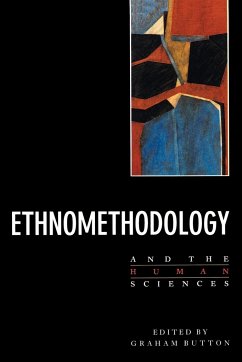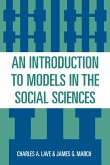Traditionally, when the human sciences consider foundational issues such as epistemology and method, they do so by theorising them. Ethnomethodology, however, attempts to make such foundational matters a focus of attention, and directly enquires into them. This book reappraises the significance of ethnomethodology in sociology in particular, and in the human sciences in general. It demonstrates how, through its empirical enquiries into the ordered properties of social action, ethnomethodology provides a radical respecification of the foundations of the human sciences, an achievement that has often been misunderstood. The chapters, by leading scholars, take up the specification of action and order in theorising, logic, epistemology, measurement, evidence, the social actor, cognition, language and culture, and moral judgement, and underscore the ramifications for the human sciences of the ethnomethodologist's approach. This is a systematic and coherent collection which explicitly addresses fundamental conceptual issues. The clear exposition of the central tenets of ethnomethodology is especially welcome.
Table of contents:
Preface; 1. Introduction: ethnomethodology and the foundational respecification of the human sciences Graham Button; 2. Respecification Harold Garfinkel; 3. Logic Jeff Coulter; 4. Epistemology Wes Sharrock and Bob Anderson; 5. Method: measurement Mike Lynch; 6. Method: evidence and inference Douglas Benson and John Hughes; 7. The social actor Wes Sharrock and Graham Button; 8. Cognition Jeff Coulter; 9. Language and culture John R. E. Lee; 10. Values and moral judgement Lena Jayyusi; References; Index.
Graham Button reappraises the significance of ethnomethodology in sociology in particular, and in the human sciences in general, showing how ethnomethodology provides a radical respecification of the foundations of the human sciences.
Table of contents:
Preface; 1. Introduction: ethnomethodology and the foundational respecification of the human sciences Graham Button; 2. Respecification Harold Garfinkel; 3. Logic Jeff Coulter; 4. Epistemology Wes Sharrock and Bob Anderson; 5. Method: measurement Mike Lynch; 6. Method: evidence and inference Douglas Benson and John Hughes; 7. The social actor Wes Sharrock and Graham Button; 8. Cognition Jeff Coulter; 9. Language and culture John R. E. Lee; 10. Values and moral judgement Lena Jayyusi; References; Index.
Graham Button reappraises the significance of ethnomethodology in sociology in particular, and in the human sciences in general, showing how ethnomethodology provides a radical respecification of the foundations of the human sciences.








